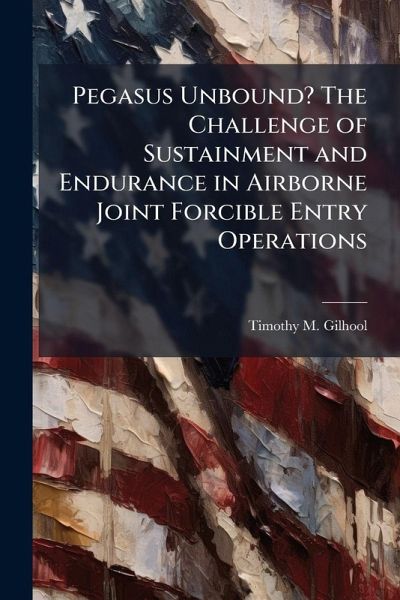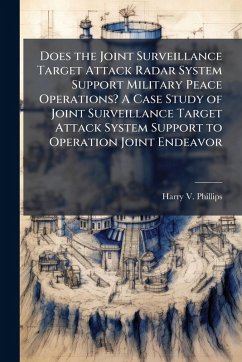
Pegasus Unbound? The Challenge of Sustainment and Endurance in Airborne Joint Forcible Entry Operations
Versandkostenfrei!
Versandfertig in über 4 Wochen
15,99 €
inkl. MwSt.
Weitere Ausgaben:

PAYBACK Punkte
8 °P sammeln!
The purpose of this monograph is to examine how the Army should best structure the logistical elements of its new Airborne Brigade Combat Team (BCT) to support Joint Forcible Entry Operations (JFEO). With the Army's current focus on becoming a more "Joint and Expeditionary" force with "Campaign Qualities," as well as the supply problems encountered by Army and Marine forces on the drive to Baghdad, logistics has once again come to the forefront. The strains involved in sustaining a parachute-delivered force in hostile territory can serve as an excellent model for just what the Army hopes to ac...
The purpose of this monograph is to examine how the Army should best structure the logistical elements of its new Airborne Brigade Combat Team (BCT) to support Joint Forcible Entry Operations (JFEO). With the Army's current focus on becoming a more "Joint and Expeditionary" force with "Campaign Qualities," as well as the supply problems encountered by Army and Marine forces on the drive to Baghdad, logistics has once again come to the forefront. The strains involved in sustaining a parachute-delivered force in hostile territory can serve as an excellent model for just what the Army hopes to accomplish with "expeditionary" logistics. The methodology used in this work is chronological, examining the past, present, and future of airborne sustainment. Data from each of the sections is evaluated against three criteria areas: Logistics Command and Control (C2), Supply Endurance, and Organizational Capability. With these three pillars, the paper delves in key historical events (World War II, Cold War, OIF), doctrine (current and proposed), structure, and ultimately results. The primary conclusion of the work is that there has been a historical underestimation of requirements and overestimation of capabilities, especially in the area of aerial delivery, for sustainment of parachute operations. To overcome these factors, the paper recommends a number of solutions across the Doctrine, Organization, Training, Materiel, Leadership, and Personnel (DOTMLPF) spectrum. These include a greater emphasis in doctrine on pushing supplies and logistical assets forward; the production of a Joint manual on JFEO; the creation of a Assault Support Platoon within the various Forward Support Companies; the fielding of improved aerial delivery platforms; and the inclusion of Airborne JFEO facilities in the Joint Sea-Basing concept. This work has been selected by scholars as being culturally important, and is part of the knowledge base of civilization as we know it. This work was reproduced from the original artifact, and remains as true to the original work as possible. Therefore, you will see the original copyright references, library stamps (as most of these works have been housed in our most important libraries around the world), and other notations in the work. This work is in the public domain in the United States of America, and possibly other nations. Within the United States, you may freely copy and distribute this work, as no entity (individual or corporate) has a copyright on the body of the work. As a reproduction of a historical artifact, this work may contain missing or blurred pages, poor pictures, errant marks, etc. Scholars believe, and we concur, that this work is important enough to be preserved, reproduced, and made generally available to the public. We appreciate your support of the preservation process, and thank you for being an important part of keeping this knowledge alive and relevant.












